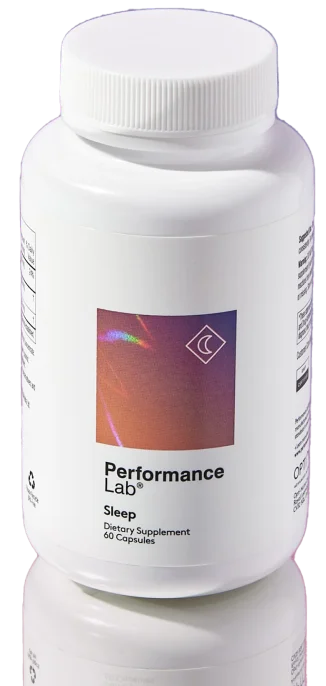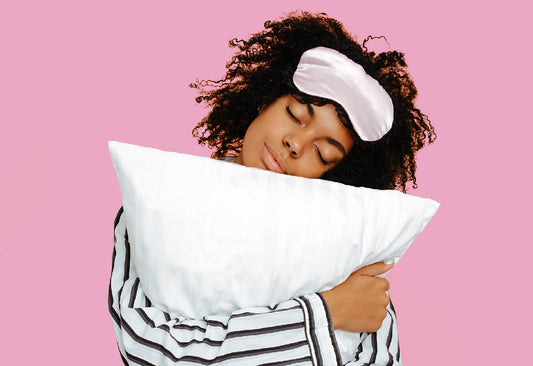If you’ve been reading up on how to improve your mood, reduce anxiety, or get better sleep, the chances are you’ve come across an article or two recommending either L-Tryptophan or 5-HTP supplements.
This is because these two compounds are often linked to serotonin production.
We know that serotonin has the reputation as a ‘feel-good’ neurotransmitter. But it goes beyond just a mood thing.
Serotonin is also linked to appetite control, cognition, digestion, immunity and of course… sleep.
So, whether the end goal is better mood or better sleep, promoting serotonin is going to be key.
And the great thing about serotonin, is that it comes with a whole side-hustle of additional benefits.
There are lots of supplements that play a part in boosting serotonin levels, but for this article we’re just going to compare L-Tryptophan to 5-HTP.
They sound quite similar: 5-Hydroxytryptophan (5-HTP) and L-Tryptophan—so how different can they be?
Let’s find out. L-Tryptophan vs 5-HTP—which is best?
Key Takeaways
Pressed for time? Here’s the short version:
- Serotonin Powerhouses: Both L-Tryptophan and 5-HTP help boost serotonin, which plays a key role in mood, sleep, appetite, and cognition.
- Different Pathways: L-Tryptophan is an essential amino acid that converts into serotonin but must compete with other amino acids to cross the blood-brain barrier. 5-HTP skips that step, making it a more direct serotonin booster.
-
Quick Fix vs. Long-Term Support:
- 5-HTP works faster but may lead to dopamine depletion over time.
- L-Tryptophan is safer for long-term use, offering broader benefits beyond serotonin.
- Why Performance Lab® Sleep Uses L-Tryptophan: It provides natural, non-habit-forming sleep support while also benefiting mood, stress, and cognition—without the risks of 5-HTP overuse.
-
Which Should You Choose?
- For short-term sleep struggles: 5-HTP might work faster.
- For consistent, sustainable sleep support: L-Tryptophan is the smarter choice.
- Looking for a science-backed, long-term sleep aid? That’s why we chose L-Tryptophan for Performance Lab® Sleep.
What is L-Tryptophan?

We’ll start by looking at tryptophan, which is an essential amino acid. It helps build proteins and produces key compounds like serotonin (5-HT), melatonin ( for sleep), kynurenine (for immune and brain function), and niacin (vitamin B3).
Our body can’t produce it, so we need to get it from diet or supplements.
If you’re wondering what difference the ‘L’ makes to tryptophan: L-Tryptophan is just the natural form of tryptophan our body uses. There is another form, D-Tryptophan, but our bodies don’t normally use this form, our bodies prefer L-Tryptophan.
L-Tryptophan is the natural form of tryptophan our body uses.
We can find L-Tryptophan in protein rich foods like poultry, seafood, dairy and red meat. If you prefer plant-based—tofu, edamame beans, and pumpkin seeds are also good sources.
Why do we need it?
It plays an important role in mood, behavior, and cognition. And has been shown to support conditions like anxiety, insomnia, and depression.(1-4) With some research indicating antidepressant efficacy comparable to certain pharmaceutical options.
What is 5-HTP?
5-hydroxytryptophan, or 5-HTP, is a naturally occurring compound in the body that is produced during the metabolization of tryptophan.
5-HTP serves as a direct and clinically effective serotonin precursor. Similar to tryptophan, 5-HTP is commonly used for:(5-8)
- Sleep disorders
- Anxiety
- Fibromyalgia
- Headaches
If you’ve looked at mood or sleep supplements before, you’ve probably seen 5-HTP included in every one of them.
Why? Because as a chemical by-product of L-Tryptophan, 5-HTP is also the immediate precursor to serotonin, which is then used to synthesize melatonin.
When the body metabolizes tryptophan, this is what happens:
L-Tryptophan → 5-Hydroxytryptophan (5-HTP) → Serotonin → N-Acetylserotonin → Melatonin
As you can see, both L-tryptophan and 5-HTP are used in the synthesis pathway of serotonin or melatonin.
Which might lead you to the question, “What’s the difference then?”
If they both eventually do the same job, does it really matter which you take?
The answer is yes. Here’s why.
What are the differences between L-Tryptophan and 5-HTP?
Although both of them synthesize the same compounds, the efficacy of these pathways is what sets them apart.
To go further into this, we need to talk briefly about the blood-brain barrier.
Significance of the blood-brain barrier (BBB)

Just as it sounds, this is a highly selective gate that only allows certain molecules to enter the brain.
Because neither serotonin nor melatonin can cross the BBB themselves, the body relies on precursors to increase serotonin levels in the brain. L-Tryptophan and 5-HTP are two possible precursors.
And this is where one outshines the other.
To cross the barrier, molecules like amino acids, need special transport proteins. These act like shuttles to carry them across.
Unfortunately, there’s a lot of competition for these ’shuttles’.
L-Tryptophan shares this transporter with larger amino acids like valine, leucine, isoleucine, and methionine.
And when concentrations of these amino acids are higher—as is the case when you eat a high protein meal—tryptophan has to compete for a ‘seat’ on this transport shuttle. And just like trying to squeeze onto a busy subway train, tryptophan may miss this ride completely, or have to wait for the next. As a result, a small amount of tryptophan ends up crossing the BBB into the brain.
Here, is where 5-HTP has a major advantage.
5-HTP doesn’t face competition from other amino acids to get through the blood-brain barrier.
While it still requires a specific transport system to enter the brain, 5-HTP bypasses the competitive bottleneck that L-Tryptophan encounters, allowing it to cross the BBB more efficiently.
If you recall from the ‘What is Tryptophan’ section, compared to 5-HTP, L-Tryptophan is the more versatile nutrient. It has choices—it can become a protein; it can synthesize niacin (B3), or, it can take the serotonin pathway.
But 5-HTP? It can’t be used for anything else so where’s it going? It’s going straight to the brain to synthesize serotonin.
So 5-HTP is the winner then?
Yes and no. More on that next.
The Pros and Cons of L-Tryptophan and 5-HTP
Dopamine Depletion
Whilst 5-HTP gains access to the brain with relative ease, it competes with dopamine precursors (like L-DOPA) for the enzyme L-aromatic amino acid decarboxylase (AAAD).
Over time, this competition can lead to lower dopamine levels and other catecholamine deficiencies. Which could potentially lead to an increased risk of depression, fatigue, and stress.
In some cases it can lead to a condition called serotonin syndrome. A potentially serious condition that’s caused by having too much serotonin in the body. Symptoms range from anxiety or disorientation, through to seizures and even loss of consciousness.
Serotonin syndrome is rare when 5-HTP is taken alone, but it can happen if too many serotonin boosters are taken together. And it’s not limited to just those on antidepressants like selective serotonin reuptake inhibitors (SSRIs). Pain medications (e.g tramadol), migraine medications (triptans), and recreational drugs (MDMA, cocaine etc) can all lead to serotonin syndrome.
Which is why long term supplementation with 5-HTP isn’t recommended. It’s potentially problematic due to these possible imbalances in neurotransmitters. Long term supplementation should only be done under the supervision of a health professional.
Unlike 5-HTP, L-Tryptophan follows a different metabolic pathway (via tryptophan hydroxylase) to produce serotonin. It does not compete directly with dopamine or other catecholamines for AAAD, reducing the risk of neurotransmitter imbalances.
L-Tryptophan also appears to be safer for long-term use, with side effects typically limited to mild cases of nausea, headaches, or drowsiness. Plus, thanks to its versatility, L-Tryptophan offers benefits that go beyond sleep.
This is why we chose L-Tryptophan for our Performance Lab® Sleep supplement.
Performance Lab® supplements are made by us, for us, and everyone.
And we know that if you’re having problems with sleep, and you’re looking for help with that, it’s probably an ongoing problem.
Yes quick fixes are enticing. And 5-HTP can certainly be a helpful tool for short term sleep issues. But safe, non habit forming, long-term support is what we’ve opted for in our natural Sleep formula.
Performance Lab® Sleep
Stress, mood, restlessness and a ‘chattering brain’ are all disruptors when it comes to sleep.
With that in mind, Performance Lab Sleep has ingredients to tackle all of them.

Stress & Mood
Our formula includes a next-generation form of L-Tryptophan sourced from non-GMO, gluten-free vegetables
L-Tryptophan converts into serotonin, which helps regulate stress levels and relaxes your body in preparation for sleep. And since serotonin also converts into melatonin, it’s like a two-for-one deal for calming your system.
We also added lemon balm extract, a traditional herb with modern scientific backing. It’s been shown to enhance GABA activity, a neurotransmitter that slows down your overactive nervous system. We’ve added a research backed dose of 200mg per serving to support mood and brain health.
Restlessness
Maybe you’re tossing and turning, struggling to find the right position. Maybe you experience the odd leg twitch or suffer from restless leg syndrome. Either way, the magnesium in our Sleep formula works by activating the parasympathetic branch of the nervous system, which is responsible for inducing calmness and relaxation.
Tag teamed to Magnesium, is our Montmorency tart cherry. The richest natural source of melatonin. This is going to help relieve and relax muscle and joint aches - making it easier to slip back into sleep.
Brain Chatter
Honestly, where does it all come from? And why?
If your brain charges through everything on your to-do list, within seconds of your head hitting the pillow, lemon balm extract is going to help with that. Lemon balm boosts GABA which can help ‘calm’ that chatter.
Meanwhile CherryPURE® Montmorency Tart Cherry melatonin is going to emulate the sedating effect of bedtime darkness. Helping you to naturally drift off to sleep AND regulate the circadian rhythm. So you can establish more consistent sleep patterns over time.


Final Thoughts: L-Tryptophan vs 5 HTP for Sleep
Who’s the winner?
There’s no winner or loser in this situation. Whether you go with L-tryptophan or 5-HTP is going to depend on what you’re looking to get out of it.
For Mild Sleep Issues or Long-Term Support: L-Tryptophan might be the better choice because of its balanced effects and gentler action.
For Severe Sleep Problems or Quick Relief: 5-HTP is often a more effective short term solution due to its direct impact on serotonin and melatonin production.
If you’re looking for safe, long term support, with benefits that accumulate and build over time, L-Tryptophan is our favorite.
- Young SN. The effect of raising and lowering tryptophan levels on human mood and social behaviour. Philos Trans R Soc Lond B Biol Sci. 2013 Feb 25;368(1615):20110375. doi: 10.1098/rstb.2011.0375. PMID: 23440461; PMCID: PMC3638380.
- Laura Steenbergen, Bryant J. Jongkees, Roberta Sellaro, Lorenza S. Colzato, Tryptophan supplementation modulates social behavior: A review, Neuroscience & Biobehavioral Reviews, Volume 64, 2016,
- Jenkins TA, Nguyen JC, Polglaze KE, Bertrand PP. Influence of Tryptophan and Serotonin on Mood and Cognition with a Possible Role of the Gut-Brain Axis. Nutrients. 2016 Jan 20;8(1):56. doi: 10.3390/nu8010056. PMID: 26805875; PMCID: PMC4728667.
- Schneider-Helmert D, Spinweber CL. Evaluation of L-tryptophan for treatment of insomnia: a review. Psychopharmacology (Berl). 1986;89(1):1-7. doi: 10.1007/BF00175180. PMID: 3090582.
- Clarinda Nataria Sutanto, Xuejuan Xia, Chin Wee Heng, Yue Shuian Tan, Delia Pei Shan Lee, Johnson Fam, Jung Eun Kim, The impact of 5-hydroxytryptophan supplementation on sleep quality and gut microbiota composition in older adults: A randomized controlled trial, Clinical Nutrition, Volume 43, Issue 3, 2024
- Kahn RS, Westenberg HG, Verhoeven WM, Gispen-de Wied CC, Kamerbeek WD. Effect of a serotonin precursor and uptake inhibitor in anxiety disorders; a double-blind comparison of 5-hydroxytryptophan, clomipramine and placebo. Int Clin Psychopharmacol. 1987 Jan;2(1):33-45. doi: 10.1097/00004850-198701000-00003. PMID: 3312397.
- Caruso I, Sarzi Puttini P, Cazzola M, Azzolini V. Double-blind study of 5-hydroxytryptophan versus placebo in the treatment of primary fibromyalgia syndrome. J Int Med Res. 1990 May-Jun;18(3):201-9. doi: 10.1177/030006059001800304. PMID: 2193835.
- De Benedittis G, Massei R. Serotonin precursors in chronic primary headache. A double-blind cross-over study with L-5-hydroxytryptophan vs. placebo. J Neurosurg Sci. 1985 Jul-Sep;29(3):239-48. PMID: 3913752.














